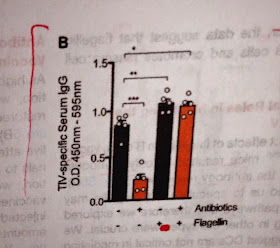Here is another Immunity
paper about microbiota with interesting twist. This paper came from
Bali Pulendran's lab in Emory. His lab focuses on systems biology
approach to immunology. The systems biology is a basically an
algorithm-driven science with minimal involvement of human experience
and intuition.
In this paper (1), the
authors made initial observation TLR5-deficient mice immunized with
FDA-approved inactivated Flu vaccine, TIV, mounted impaired antibody
response compared to wild-type mice.
Reduced antibody response was
more apparent at early stage, at day 7, but not at day 28.
Correspondingly, number of TIV-specific antibody-secreting cells in
draining lymph nodes was reduced at day 7. However, interestingly,
serum level of TIV-specific IgG at day 84 in TLR5-deficient mice was
again lower compared to wild-type mice suggesting that both early and
long-term antibody production were affected by absence of TLR5.
Since TIV itself does
not interact with TLR5 directly,
the authors tried to understand how
absence of TLR5 impacted response to TIV. Interestingly, the authors
found that germ-free mice or mice treated with broad-spectrum
antibiotics showed similar impaired response to TIV, similar to
TLR5-deficient mice.
Germ-free mice inoculated with gut microbiota showed restored response to TIV.
In addition, the authors
showed that supplementation of TIV with flagellin (TLR5 agonist)
improved TIV-specific antibody response in antibiotic-treated mice.
Further experiments
showed that TLR5 signaling in hematopoietic cells (specifically, in macrophages) were critical to TIV antibody response.
Finally, the authors
showed that dependency on TLR5 for TIV-specific antibody response was
not unique for TIV. IPOL, another inactivated vaccine consisting of
polio virus subunits, also required TLR5 for full response. However, live-attenuated vaccine or alum-adjuvanted vaccines did not require TLR5 for full response.
In summary, this study
indicates that even vaccine efficacy is depended on gut microbiota.
David








No comments:
Post a Comment